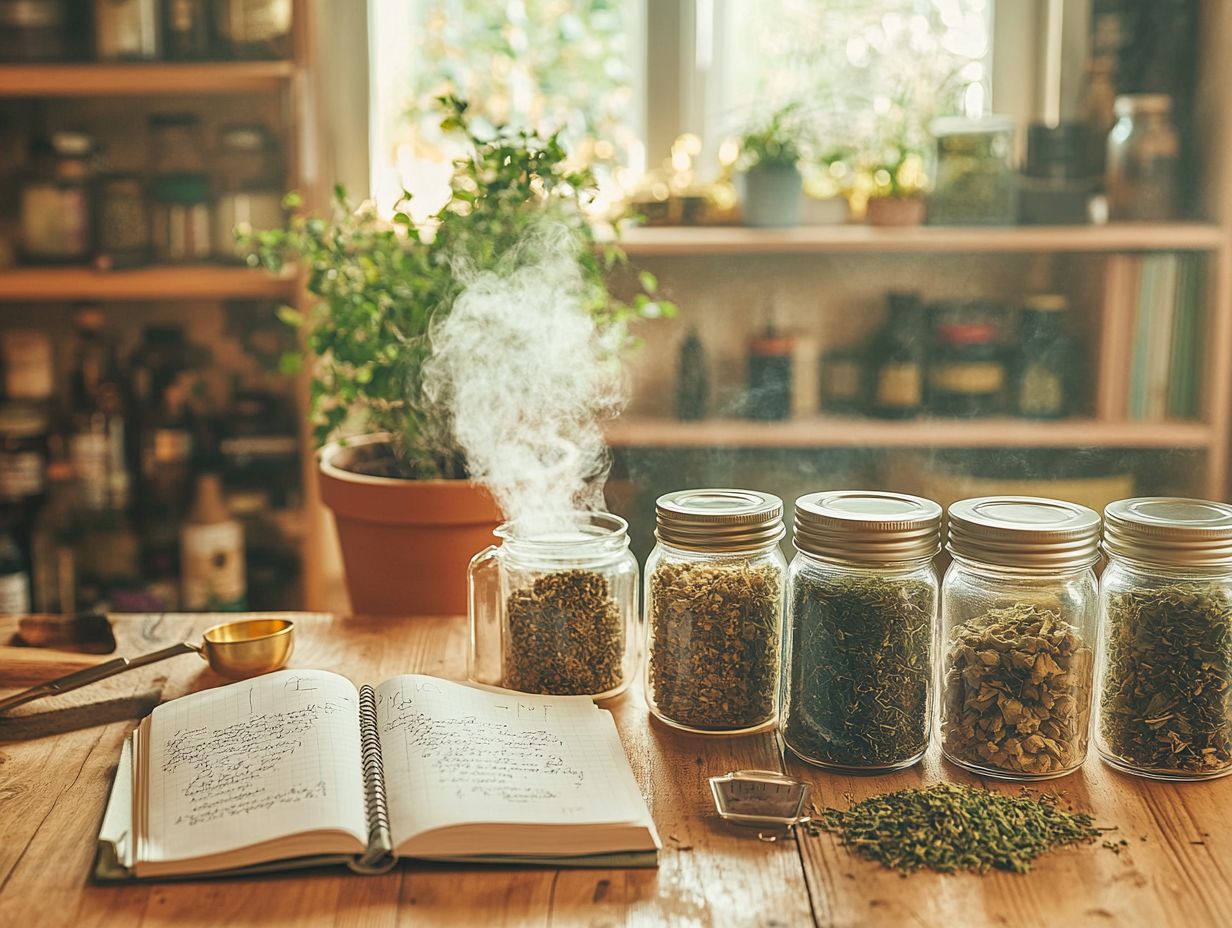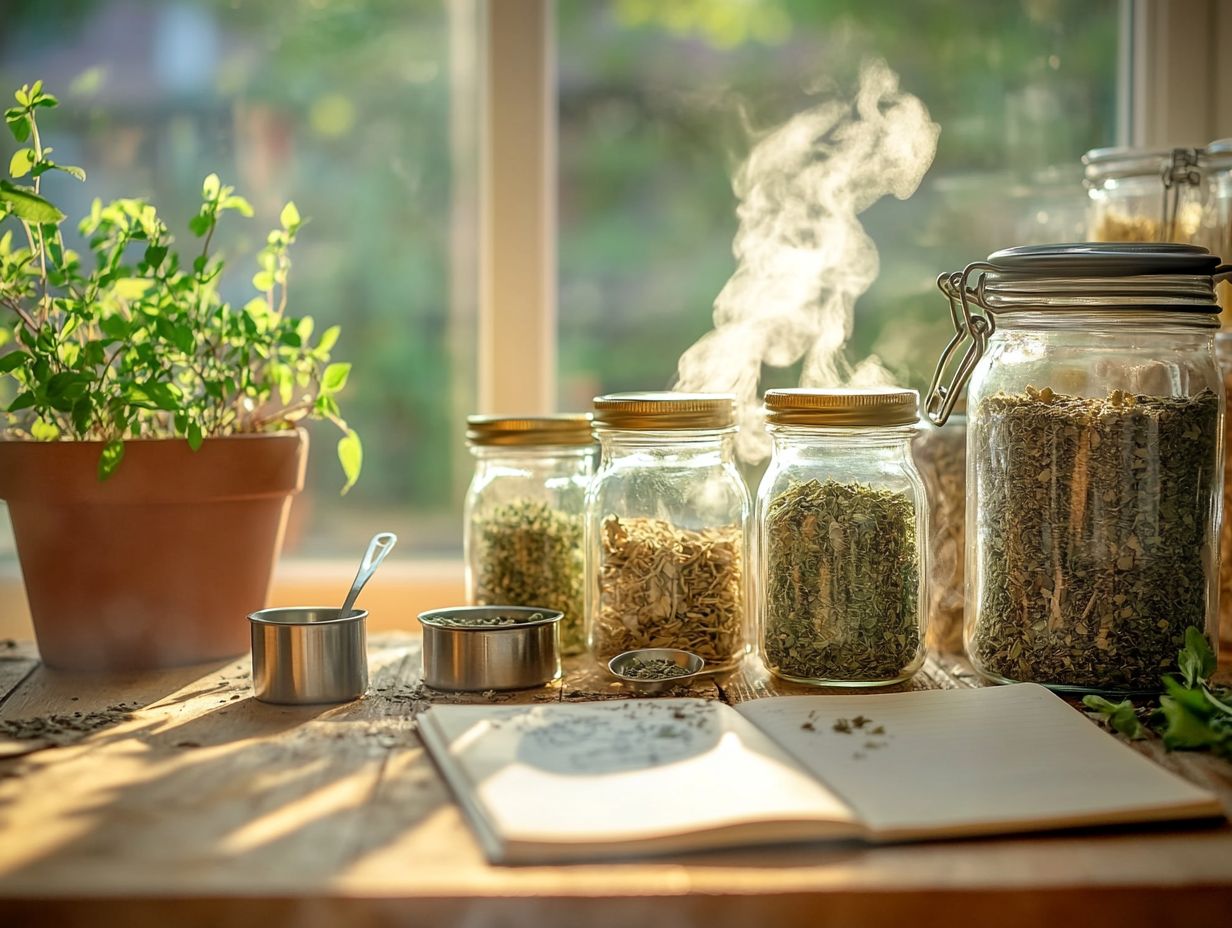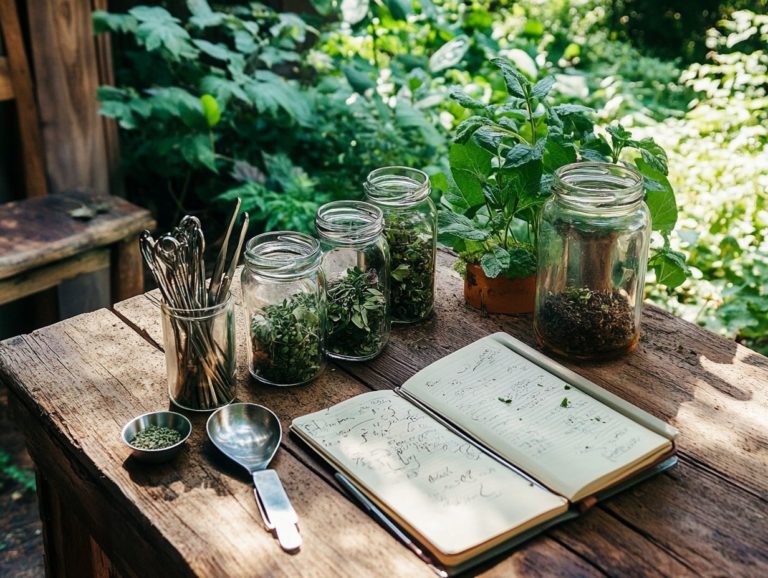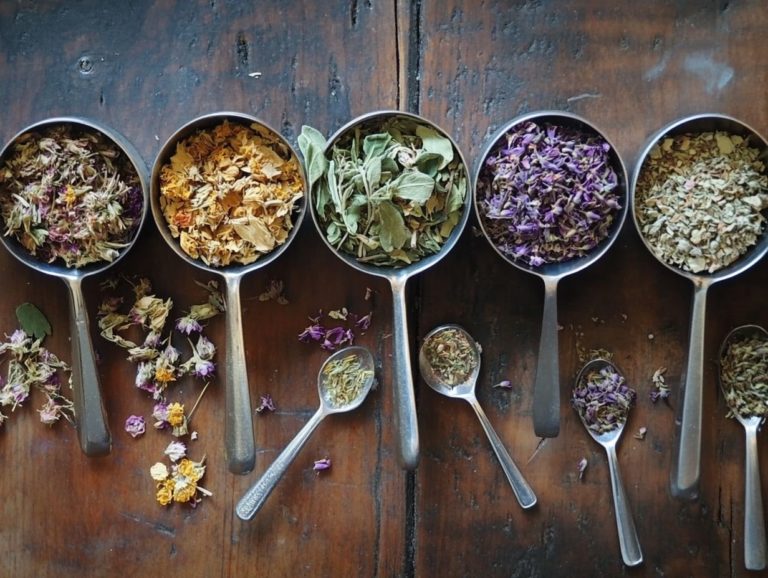How to Create a Safe Herbal Dosage Plan
Creating a safe herbal dosage plan is vital for anyone eager to harness the benefits of natural remedies, including various herbal products, without exposing themselves to unnecessary risks.
To ensure optimal effectiveness, consider several crucial factors. These range from your individual health conditions to the unique characteristics of each herb and its potential health benefits.
This guide will help you understand safe herbal dosages and how to create your plan. It also offers insights on how to monitor your progress with your herbal supplements and adjust as needed along the way.
Embrace this opportunity to elevate your herbal journey and enhance your overall well-being!
Contents
- Key Takeaways:
- Factors to Consider for Safe Herbal Dosage
- Methods for Calculating Dosage
- Creating a Dosage Plan
- Monitoring and Adjusting Dosage
- Frequently Asked Questions
- What is a herbal dosage plan and why is it important?
- How do I create a safe herbal dosage plan?
- What factors should I consider when creating a safe herbal dosage plan?
- Can I create my own herbal dosage plan without consulting a professional?
- Are there any safety precautions I should take when following a herbal dosage plan?
- Can I adjust my herbal dosage plan as needed?
Key Takeaways:

- Consider individual health factors, specific conditions, and herb-specific considerations when determining a safe herbal dosage.
- Use percentage-based or weight-based methods to calculate dosage accurately and follow safety rules.
- Create a detailed dosage plan for your herbal formulations and regularly monitor progress, adjusting as needed for optimal safety and effectiveness.
Understanding the Basics
Understanding the basics of herbal medicine is crucial. It means recognizing the importance of herbs and their traditional uses rooted in traditional medicine.
The diverse herbal products available today cater to your unique health needs. This holistic approach blends ancient wisdom from various cultures including Ayurveda and Traditional Chinese medicine with modern herbal research.
This ensures that you have access to reliable therapeutic properties of these medicinal herbs as you seek natural solutions for your well-being.
Herbal medicine boasts a rich history, with practices stretching back thousands of years across multiple civilizations. Herbs were cherished for their healing properties, reflecting deep cultural values.
While traditional applications varied, they all shared a belief in the harmonious relationship between humans and plants, integral to various herbal practices. Recently, you may have noticed a significant resurgence in interest in these time-honored practices, reflecting an increasing trend in holistic health and wellness and herbal education.
As you explore herbal products, including dietary supplements, it’s crucial to consider key aspects like quality control and the ethical sourcing of ingredients. This ensures that what you re using is both safe and effective.
Seeking guidance from qualified health practitioners, including herbalists, or engaging with professionals like those at Mountain Rose Herbs, is equally important. They can provide tailored advice, helping you make informed choices that align with your health goals.
Factors to Consider for Safe Herbal Dosage
When determining the safe dosage of herbal supplements, it’s essential to consider several factors that influence both efficacy and safety.
These factors include your individual health conditions and the specific properties of the herb in question. Ensure you follow safety rules established by regulatory bodies like the FDA, ensuring compliance with established health claims.
By understanding these elements, you can make informed decisions and steer clear of any potential harm that may arise from improper use of herbal preparations. This also ensures quality assurance in what you choose.
Individual Health Factors
Individual health factors are crucial when selecting and dosing herbal supplements. Your specific health needs and responses can significantly influence both the efficacy and safety of these botanical products.
If you have a pre-existing condition like diabetes, you may notice different effects from herbs such as cinnamon, fenugreek, or even turmeric, compared to someone without those concerns. Allergies also play an important role; you may react adversely to certain herbs that are generally considered safe for most people.
Your lifestyle, including diet, stress levels, and activity, can affect how these supplements, including herbal extracts, work in your body. Consulting with a qualified health practitioner or a knowledgeable herbalist is a must!
They can help tailor herbal combinations to fit your unique health circumstances, ensuring that any potential adverse reactions are recognized and addressed, all while enhancing your overall well-being through informed herbal sourcing.
Herb-Specific Considerations

When you evaluate herb-specific considerations, it s crucial to understand the unique properties of each medicinal herb, including its strength, preparation methods, and the quality of the herbal extracts involved in formulations, which may vary by region, including European countries.
Take turmeric, for example. It s celebrated for its anti-inflammatory properties, largely due to its active compound, curcumin, which has gained attention through various marketing strategies for health food products. Proper preparation like pairing it with black pepper can significantly enhance absorption and efficacy, making it a popular choice among herbal practitioners.
Similarly, ashwagandha is praised for helping the body handle stress and enhancing the immune system. However, its effectiveness can vary based on the extraction process (the method used to obtain beneficial ingredients from plants) and quality herbs and herbal sourcing practices, so that s something to keep in mind.
Then there s lion s mane mushroom, which is renowned for its cognitive benefits and potential neuroprotective effects, often linked to traditional medicine practices. Sourcing it from reputable suppliers, including well-known brands like Banyan Botanicals and Elements Drinks, is key, as this ensures higher levels of bioactive compounds.
By understanding these nuances, you not only maximize therapeutic outcomes but also promote your overall health and well-being through responsible herbal practices.
Methods for Calculating Dosage
Calculating the right dosage of herbal formulations, including the nutritional value of herbal supplements, is essential for optimizing their health benefits while minimizing the risk of adverse reactions.
You can achieve this through various methods, such as percentage-based and weight-based dosage calculations, customized to fit individual health profiles and therapeutic objectives, ensuring compliance with established safety standards.
For personalized advice, don t hesitate to consult a practitioner!
Percentage-Based Dosage
Percentage-based dosage is a simple method for determining the optimal amount of an herbal product based on its concentration. This ensures you receive effective therapeutic levels without crossing into unsafe territory.
This approach is particularly beneficial for various herbal formulations. The potency of active ingredients can change significantly due to sourcing practices.
By utilizing percentage-based dosages, you can accurately assess how much of a substance you are consuming. This minimizes the risk of adverse effects and ensures quality control. For example, if you come across a tincture labeled as 20%, it signifies that 20 grams of the herb is contained in every 100 milliliters of the solution, highlighting the importance of precise dosage recommendations.
Common products that adopt this method include various herbal extracts and formulations:
- Essential oils
- Herbal capsules
- Extracts from plants like echinacea or valerian root
Adhering to dosage recommendations is crucial for achieving your desired outcomes while prioritizing safety and compliance with health assessments. By knowing your body weight and the percentage of the active ingredient in the product, you can calculate your needs effectively. For guidance on when to adjust your herbal dosage, this allows for a tailored and responsible approach to herbal supplementation that also considers dietary supplements.
Weight-Based Dosage
Weight-based dosage is a widely embraced approach in herbal medicine. It calculates the amount of a herbal supplement based on your body weight, which is essential for effective therapeutic dosage. This personalizes the therapeutic dosage to enhance your health benefits, especially when considering individual health assessments.
It s important to recognize that everyone s metabolic rate your body’s speed in processing substances and response to herbal treatments can vary significantly. This makes a one-size-fits-all solution far less effective.
Consider factors such as your age, sex, health conditions, and even lifestyle habits; these all play a crucial role in determining the right dosage for you and should be assessed by a qualified health practitioner. If you weigh 150 pounds, your needs may differ considerably from someone tipping the scales at 300 pounds, especially regarding herbal formulations and their potency.
An individual with a chronic illness may process herbs differently compared to someone in good health, further influencing their health journey and outcomes. Therefore, you must adjust dosages not only according to weight but also based on comprehensive health assessments, keeping in mind the quality herbs and their sourcing.
This ensures that the benefits of herbal supplements are tailored specifically for you, maximizing their effectiveness while ensuring quality assurance in the products you choose.
Creating a Dosage Plan

When creating a dosage plan for herbal supplements, take a systematic approach. This should include thorough health evaluations and education about the herbs, including their traditional uses and quality control, as well as established guidelines.
By doing so, you can ensure a safe and effective integration of these botanical products into your health journey, allowing for informed decisions about their sourcing and quality.
Step-by-Step Guide
Creating a dosage plan begins with a detailed health check. This critical step allows you to identify your individual health needs and specific conditions.
Next, you should also research beneficial herbs that align with those specific needs. Ensure these herbs are ethically sourced, safe, and effective for your unique situation.
Pay close attention! This is key to your success in calculating dosages, which means figuring out how much to take based on your age, weight, and any underlying health conditions.
Establish a preliminary dosage, and remember that tracking your progress with your herbal formulations is essential. This will help you evaluate how well it’s working and make necessary adjustments.
Keep communication open with a health practitioner or a knowledgeable herbalist. This collaboration ensures that you receive the guidance and support you need, fostering a well-rounded approach to your wellness journey.
Monitoring and Adjusting Dosage
Monitoring and adjusting the dosage of herbal supplements is essential for achieving optimal health outcomes and minimizing risks. This practice gives you the ability to adapt to your evolving health needs and responses to herbal products.
By staying attuned to your body’s signals, you can enhance your well-being while ensuring a safer, more effective approach to supplementation.
How to Track Progress and Make Changes
To truly track your progress and make informed adjustments to your herbal supplement dosages, maintain a detailed log of your experiences. Note any changes in your health and overall well-being.
By employing methods such as journaling, you can cultivate a personalized understanding of these effects. Digital tools and apps also provide intuitive ways to visualize your progress over time.
Recognize key indicators for dosage adjustments, like persistent side effects or frustrating plateaus in improvement. Engaging in regular communication with your health practitioners is essential.
This collaboration enhances your safety and empowers you to take charge of your health journey.
Frequently Asked Questions

What is a herbal dosage plan and why is it important?
A herbal dosage plan is a customized plan that outlines the recommended dosage and frequency for taking herbal remedies. It is important because it ensures that you are taking the right amount of herbs to achieve the desired effects and avoid potential side effects.
How do I create a safe herbal dosage plan?
To create a safe herbal dosage plan, consult a qualified herbalist or healthcare provider who can assess your individual needs. They can recommend the appropriate herbs and dosages for your specific health concerns.
What factors should I consider when creating a safe herbal dosage plan?
- Your age
- Your weight
- Your overall health
- Any existing medical conditions
- Any medications you are currently taking
These factors can all affect how your body responds to herbal remedies and determine the appropriate dosage for you.
Can I create my own herbal dosage plan without consulting a professional?
It is not recommended to create your own herbal dosage plan without consulting a professional. Herbal remedies can interact with medications and may have different effects on different individuals.
It is crucial to seek guidance from a qualified herbalist or healthcare provider to ensure a safe and effective herbal dosage plan.
Are there any safety precautions I should take when following a herbal dosage plan?
Yes, it s crucial to stick to the recommended dosages and frequency in your herbal dosage plan. If you notice any negative side effects or have concerns, consult your healthcare provider right away.
Always buy high-quality herbs from trusted sources. Make sure to store them properly, following the specific instructions provided.
Can I adjust my herbal dosage plan as needed?
Your herbal dosage plan may need adjustments as your health changes. Always talk to your healthcare provider before making any changes to keep your plan safe and effective.
Track any changes you make and pay attention to how your body responds to the herbs. This will help you stay informed about what works best for you.
Take charge of your health today! Consult your healthcare provider to ensure your herbal plan is right for you.





